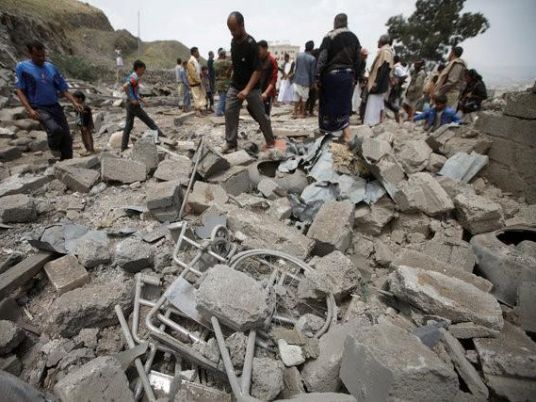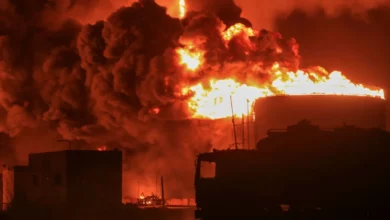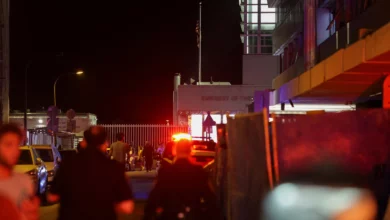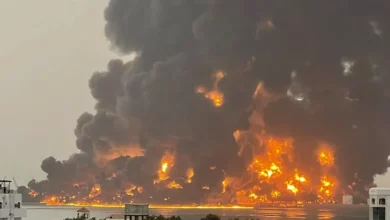
The whitewashed dome of a Sufi shrine in the Yemeni city of Taiz gleamed for centuries until a band of hardline Sunni Islamist gunmen blew it up last month, victim to a civil war that may have disfigured a once-tolerant society beyond repair.
After a year and a half of fighting, rivalries based on tribe, region and sect have deepened and Yemen appears no longer able to resist the hatreds that have fuelled wars without end in other Middle Eastern countries.
"Before the war, there was no interest in denominations and family. Now, people scrutinize your name to see where you come from," said Ahmed Saleh Al-Matari, 40, a civil servant in the capital Sanaa.
Unusually in a Muslim country, Yemen's Sunni and Shi'ite Muslim schools of thought had few doctrinal differences and worshippers often shared the same mosques. That has also changed.
"Even mosques were not as they are now, with the (Sunni) Islah party and Salafis running some mosques and the (Shi'ite) Houthis running others," Matari added. "We've arrived at such a dangerous situation."
War has reduced much of Yemen to battle zones, laced with landmines and roamed by militias whose quarrels seem to defy any resolution. Around half the 27 million population have no access to healthcare and are unable to put enough food on the table, while around 80 percent need some form of humanitarian aid, according to the United Nations.
As three months of U.N.-mediated peace talks collapsed over the weekend, nationwide fighting and coalition air strikes accelerated once more.
The armed Houthi group, once an obscure revivalist movement of Zaydi Shi'ites, predominant in the north, controls the capital Sanaa along with many other cities and pushed President Abd-Rabbu Mansour Hadi's internationally recognized government, backed by Saudi Arabia and its fellow Sunni-ruled Gulf states, into exile last year.
Pro-government forces largely from the Shafi'i Sunni majority in the south and east made gains last year, but appear far from victory despite arms and air cover from the Saudi-led military alliance.
Saudi Arabia fears the Houthis represent a foothold on the Arabian Peninsula for political Shi'ism inspired by Iran, and has quashed Shi'ite political stirrings both inside Saudi Arabia and in neighboring Sunni-ruled Bahrain, a key ally.
Hashemites
Frustrated by generations of coups, corruption and cronyism that have left the country one of the poorest in the world, some Yemenis welcomed the Houthis' takeover of Sanaa in 2014, billed by the Houthis as a popular revolution.
The group has built alliances with poor but heavily armed northern tribes, and made the capital into a bulwark that has weathered thousands of air strikes by a Saudi-led alliance wielding some of the most advanced Western weapons.
The Houthis formalized their rule on Saturday by setting up a governing council in league with allies of the powerful ex-president Ali Abdullah Saleh, in a move decried by both the United Nations and the government in exile.
But more subtle than their overt takeover of the state is the Houthis' installation, in military and administrative positions throughout Yemen, of members of Hashemite families, who trace their lineage to the Prophet Mohammad.
The families, making up about 10 percent of Yemen, were important administrators in the Zaydi theocracy that ruled the north for a millennium before being largely marginalized in the wake of a 1962 republican revolution.
"The new political council brings together the Houthi base and the traditional tribal elite loyal to Saleh and strengthens them," said Farea al-Muslimi, an analyst at the Sanaa Centre for Strategic Studies.
"It unifies the interests and loyalty of the most powerful military and political actors in northern society."
The sudden power shifts have unleashed demons, however, especially in Taiz, the southern city that was once a bastion of commerce and secularism.
Artillery duels between Houthi forces and a loose alliance of mostly Sunni Islamist pro-government militias have reduced much of the city to rubble without giving either side proper control, and street clashes beset much of the city.
Hardline Islamist gunmen are thought to be behind the attack on the tomb of Abdul Hadi al-Soudi, a 15th-century scholar from the more mystical and tolerant Sufi school of Sunni Islam.
"The most powerful forces fighting for the government in Taiz are al Qaeda and the Salafi militias," a senior security official said.
"Hashemites are being targeted just for their names, and dozens have been assassinated in Taiz alone."
Exiled government
Despite gains, Yemen's recognized government operates from Saudi Arabia and is therefore finding it hard to build a power base inside the country.
The southern port city of Aden, where the government has pledged but so far failed to establish itself, is out of reach of the Houthis but is still plagued by jihadist attacks.
It is run by militias and army officers who seek secession for southern Yemen, once an independent socialist state, and distrust the government, in which the Sunni Islamist Islah party is the strongest.
Political sources close to the failed U.N.-backed talks in Kuwait say that both the Houthis and the recognized government appear to believe that time favours them and the other side may soon exhaust themselves and implode.
Meanwhile, the economy is deteriorating on both sides of the divide – shops and factories lie idle or in ruins, electricity and fuel are in short supply and vital institutions shudder.
The internationally recognized government last week asked international financial institutions to cut off the Sanaa-based central bank, alleging that state funds were being used to fuel the Houthi war effort.
Bank sources have denied the charges and have suggested the moves may be a form of economic warfare on the Houthis, as state salaries paid by the bank go mostly to Houthi-run areas.
But with the central bank guaranteeing food imports as Yemen approaches famine, one senior Western diplomat wondered whether the government had put its war aims before ordinary people's needs – something the government has denied.
"A good government should care for the wellbeing of the entire nation, its people," the diplomat said.
"There are real concerns that the government does not seem to care much … Trying to bring down the Central Bank in a country like Yemen is like prompting a heart attack in a body already suffering from multiple organ failure."




